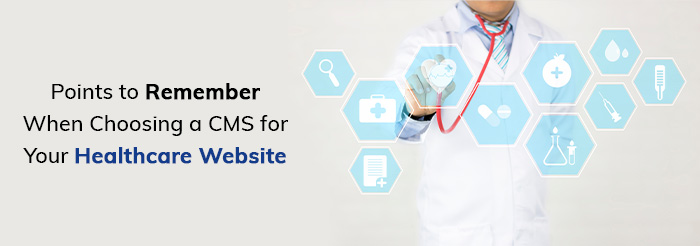Points to Remember When Choosing a CMS for Your Healthcare Website
Posted on
When you’re looking to improve your digital patient experience, one of the most important decisions you can make is choosing the right health content management system, or CMS. What is CMS in healthcare all about?
CMS is a software solution that stores your digital content, including your web pages, photos, features, and workflows. While all CMSs are editable and most are intuitive, a content management system that is engineered specifically for healthcare providers deserves special consideration.
Your healthcare practice website requires unique features, such as a provider directory, HIPAA-compliant forms, and data protection. Your CMS could mean the difference between a potential patient completing an appointment request or jumping to another provider’s website.
Fortunately, there are many proprietary healthcare content management system solutions. How do you determine which one is right for you? Here are 10 ways to find the best CMS for healthcare and make a more informed decision about which healthcare content management system meets your practice’s needs.
1. Is it user- and patient-friendly?
People with various experience levels will likely use your CMS to write, edit, and publish web pages quickly. The CMS you choose should offer an intuitive interface, built-in spellchecking tools, and a content editor to help you create pages, upload assets, preview your user experience, and make edits — all without involving an IT professional.

Consider your team’s workflow processes and how easily a CMS lets you review, edit, and approve content. Some CMSs offer built-in workflow tracking, which can streamline your tasks.
Your CMS should also offer design elements that allow patients and prospects to find what they need easily and quickly. A seamless user experience, or UX, is a must. The CMS you choose should have embedded search fields, a clear navigation menu, easy-to-find form fills, and complete contact info. A site map can make it easier for a site visitor to find your pages.
2. Will it protect your patients’ data?
To be HIPAA-compliant, healthcare CMS requires specific safeguards to protect your patients’ privacy. Your CMS should include the encryption and security you need:
- HIPAA-compliant forms and workflows
- Monitoring for third-party intrusion
- User roles and permissions that prevent unauthorized access to your CMS
Make sure to consult HIPAA experts at your practice when choosing a CMS to ensure that the CMS you choose meets HIPAA and security standards.
3. Is your healthcare website responsive?
Since more users are accessing websites on mobile devices, make sure your website has a mobile-first and responsive design. Look for a CMS that automatically adjusts content to fit desktop computers, tablets, and mobile screens. This will help your team streamline your content while creating the best possible experience for your web visitors.

4. Is your healthcare website optimized for SEO?
A healthcare CMS should have built-in search engine optimization, or SEO. SEO can mean the difference between your practice ranking first in search results and having it buried on page 9.
Your CMS should provide separate fields for metadata, title tags, and keywords. Your ability to write for SEO before you implement a new CMS can help you make the most of these features.
Remember that inefficient coding on the back end of your website can slow down page loading speed, which can impact your search ratings.
5. Is your CMS healthcare scalable for the future?
As your health practice grows, your website should grow with you, so choose a CMS that will adapt as you acquire new facilities, undergo mergers, and add new providers or technologies. Also, a reliable CMS will allow you to host multiple sites, if needed.
Consider other digital assets or technology your practice might use in the future. These might include mobile apps, voice-command technology, online scheduling, telehealth visits, and even chatbots. The CMS you choose should match your needs now and in the future.

6. Does the CMS have a digital asset manager?
Digital asset managers, or DAMs, store and organize your asset files including images, videos, and other media. This valuable tool helps you manage a photo library, educational videos, and other items. DAM systems make your assets easier to find and easier to implement across your website while maintaining your standards and security.
7. Which measurement tools does the CMS offer?
A CMS that includes data and reporting can help you measure traffic to your site and determine the success of your content. With good analytics, you’ll know who is coming to your site, what they’re looking for, and when they leave.
Does your new CMS offer traffic reports? What other measurement tools does it have? These measurement tools may become your main source for analytics and your best method for monitoring and optimizing both web traffic and conversions.
Does your CMS offer its own analytics? If not, does it integrate with external measurement tools like Google Analytics? Choose a CMS that allows seamless integration with Google Analytics to save you time.
8. Does your CMS integrate with other systems?
Do you have a customer relationship management (CRM) system in place? Do your digital data, records, billing information, or electronic health records need to interface with your new website? The chosen CMS should align with pre-existing systems to avoid duplicating work.

9. Does your CMS offer you support?
When you implement and work with a new CMS, you’ll probably have questions. Avoid the frustration of overburdening your IT team by learning what support solutions your new CMS provides. Do they offer onboarding training, concierge service, or ongoing 24/7 support? Determining what’s available and what you’re likely to need can create a more seamless experience when you switch to a new healthcare CMS.
10. Does your CMS let you personalize your healthcare content?
Some CMS platforms offer dynamic content based on the user’s location or behaviors. If a visitor is searching for a specific treatment or procedure, they’ll see relevant providers and events based on that search. Certain content may populate based on the users’ locations. Sometimes, a CMS serves up content based on user actions. For example, a blog post on low back pain may pop up when the user clicks on an article about pain management.
Thanks to dynamic content in your CMS, users can find the right information at the right time. This helps you build better relationships with potential patients and referring providers.
When choosing a new CMS, you’ll likely have many questions. Knowing your requirements and aligning them with your content goals can help you deliver a better digital patient experience.
The healthcare content strategists at Practice Builders can help you create a healthcare website that attracts and converts. You can make your life much easier and more profitable by consulting with the healthcare marketing experts at Practice Builders. To learn more, visit practicebuilders.com or call 855-898-2710.

 What Is YMYL and What It's Impact on Healthcare SE..
What Is YMYL and What It's Impact on Healthcare SE.. 7 Christmas Social Media Post Ideas for Hospitals ..
7 Christmas Social Media Post Ideas for Hospitals .. How to Create a Winning Healthcare Marketing Strat..
How to Create a Winning Healthcare Marketing Strat..